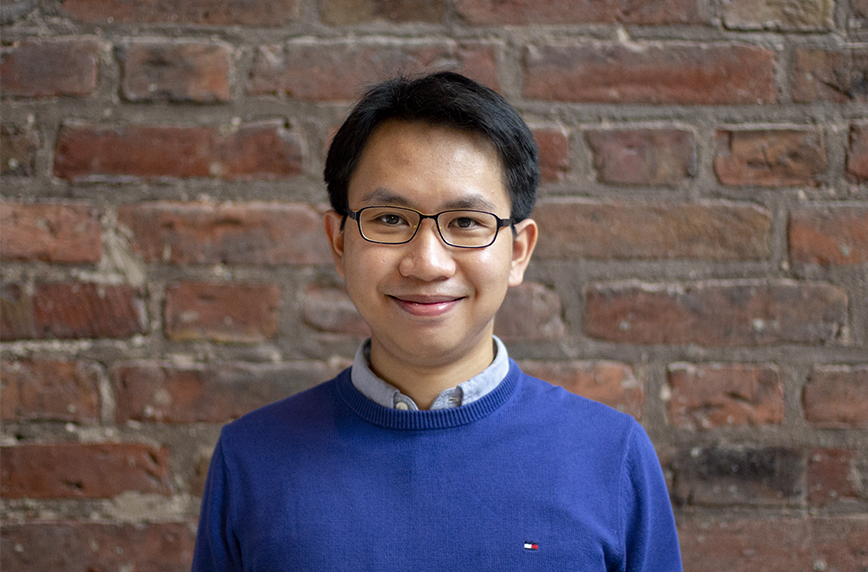Studying at KTH allows me to have a closer tie with the industry and develop connections
Edwin comes from Hong Kong. Before pursuing his studies in Stockholm, he spent four years at the University of Hong Kong (HKU) for his bachelor’s degree. In his leisure time, he hikes, plays board games, and watches football.

Why did you choose this master’s programme at KTH?
After finishing my bachelor studies, I decided to study my master’s degree in Europe. However, not every university in Europe offers courses in English, particularly for civil engineering. KTH is one of the few universities to offer all courses in English and is also one of the best technical universities in the Nordic region. I am impressed by the effort of KTH on sustainable development on the campus and in our curriculum. KTH is ranked top 10 in sustainable development based on the UN goals, and the courses in KTH help me to understand the role of civil engineers in the future development of infrastructure.
What are the best aspects of your programme?
The master’s programme at KTH is extremely flexible. There is only one mandatory course and we can choose courses freely from different civil engineering disciplines. Additionally, we can choose up to three courses not from the syllabus, purely based on our interest. Most of the courses here at KTH last for 6–8 weeks. The pace is faster in each period compared to HKU but it allows me to focus more on what I am studying as I only have to study two courses at a time.
Have you chosen a specialisation track within the programme? If Yes, which track and why?
There is no specialisation track in the programme, but most of my courses are structural engineering courses with a few geotechnical courses to complement the understanding of construction.
What are your favourite courses thus far?
Thus far, I enjoy the Finite Element Modelling in Analysis and Design course. However, I would occasionally find it challenging as I had little MATLAB knowledge prior to the course. It provided me with a lot of hands-on experience on the topic and practical tools that would be useful in my master thesis and future work.
How do studies at KTH differ from your previous studies?
While courses in HKU have more laboratory sessions and are more theory-based, there are more collaborations and projects at KTH. During tutorials in KTH, we apply theories to our projects. We reach specific targets in each session, and we ultimately design something based on what we have learnt. The lecturers and tutors are extremely helpful, both academically and socially. All the professors and lecturers have a good reputation and experience within the industry; this gives me a better picture of how knowledge from the class is applied in the construction industry, and it provides relevance to the theories I have learnt. Studying at KTH allows me to have a closer tie with the industry and develop connections. In my opinion, the intertwining relation between KTH and the industry is invaluable to a student’s academic and vocational development.
How is student life in Stockholm?
Stockholm is a convenient city as it has a well-connected metro system operated by the Hong Kong-based company, MTR. There are many international students in Stockholm from various universities. You will have no problem getting along with the students from KTH and outside of KTH. I have opportunities to work in different student organisations, including THS Future, Engineers without Borders KTH and IAESTE Stockholm. I thoroughly enjoyed working in the international environment of these organisations. It made me realise that a lot of students at KTH are determined and visionaries. I met many students on the Student Sustainability Council who had brilliant ideas and initiatives to bring positive changes to the campus and society. The only sad thing was the coronavirus. I did not get to enjoy the summer and the outdoor life in Stockholm to the fullest.
How would you describe your time at KTH so far?
It could not have been better. I get to meet a lot of interesting people and also work with some of them. I have fond memories of events held by THS MAINS and the S chapter. I really enjoy the international experience here in KTH.
What do you want to do after graduating?
After graduation, I would like to be a geotechnical engineer in an international engineering consultancy firm, focussing on underground structures and tunnels.
What would you like to say to students thinking of choosing KTH for their master’s studies?
Study at KTH. You will not regret it. You will learn in an environment of innovation and collaboration.
